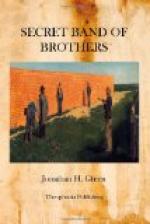“The stranger gave me his address, and requested that I would keep an eye upon the people who should come there, and if I should see the Browns, or hear of his unfortunate friend, that I should let him know. He had visited Lawrenceburgh, because that was the former residence of these two men, and he hoped to see them; but being disappointed, he was compelled to go back to the family of the lost neighbour without having received any intelligence of his fate.”
The reader will have seen by this time, that, probably, the whole transaction was arranged before the man bought the first hoof of that drove of hogs. Some emissary of the Browns advised him to speculate in pork; to use his credit, which was good, and he did not see the Browns till he was preparing to start. They make him liberal offers, because they never intend to pay, and it matters little what they offer. He then sends some of the meaner members of the gang to the landing, to order him a few days’ journey further, and there they meet him again, and butcher, and pack the hogs. They are well paid for their villany by the job, which they take care to make a fat one. The merchant was paid for his part of the rascality by the profit on his stores, and perhaps by a bonus out of the money advanced. They then thought that if they could implicate him in any unlawful business, he would tell no tales about them; accordingly, they entice him, or rather drive him to the counterfeit trade. But conscience makes bad men cowards, and they felt uneasy, so, by means of some of the band, they have him arrested; the proof is so positive that he must be convicted, and the poor fellow was thrown into the penitentiary. But even here they did not consider him safe, although under a false name; so, through the influence of some of the aristocracy, they get him pardoned; and then the moment he is free, they meet him, tell him of all they have done for him, and propose a new scene of action. Poor fellow, what can he do? He goes with them to this new scene of action, but in all probability he finds it a state of rest, for “dead men tell no tales.”
Thus, for the paltry price of a drove of hogs, was an honest man ruined, and, for fear of detection, murdered.
CHAPTER XII.
Probably in no era of the world, and certainly never among a Christian people, was there formed a more bold, daring, and, at the same time, secret association, than the one whose constitution and by-laws we now present to the reader. Composed of men of all classes and grades in society, from the priest at the altar, the judge on the bench, the lawyer at the bar, down to the most common felon and street thief or pickpocket, all bound together by a solemn oath, they laboured for the general cause of secret plunder, to the enriching of themselves at the expense of the mass. But having previously shown how I procured my information regarding these desperadoes, I shall leave farther comment on their acts, for the present, to the public, before whose tribunal they must be arraigned, and proceed at once to present their




